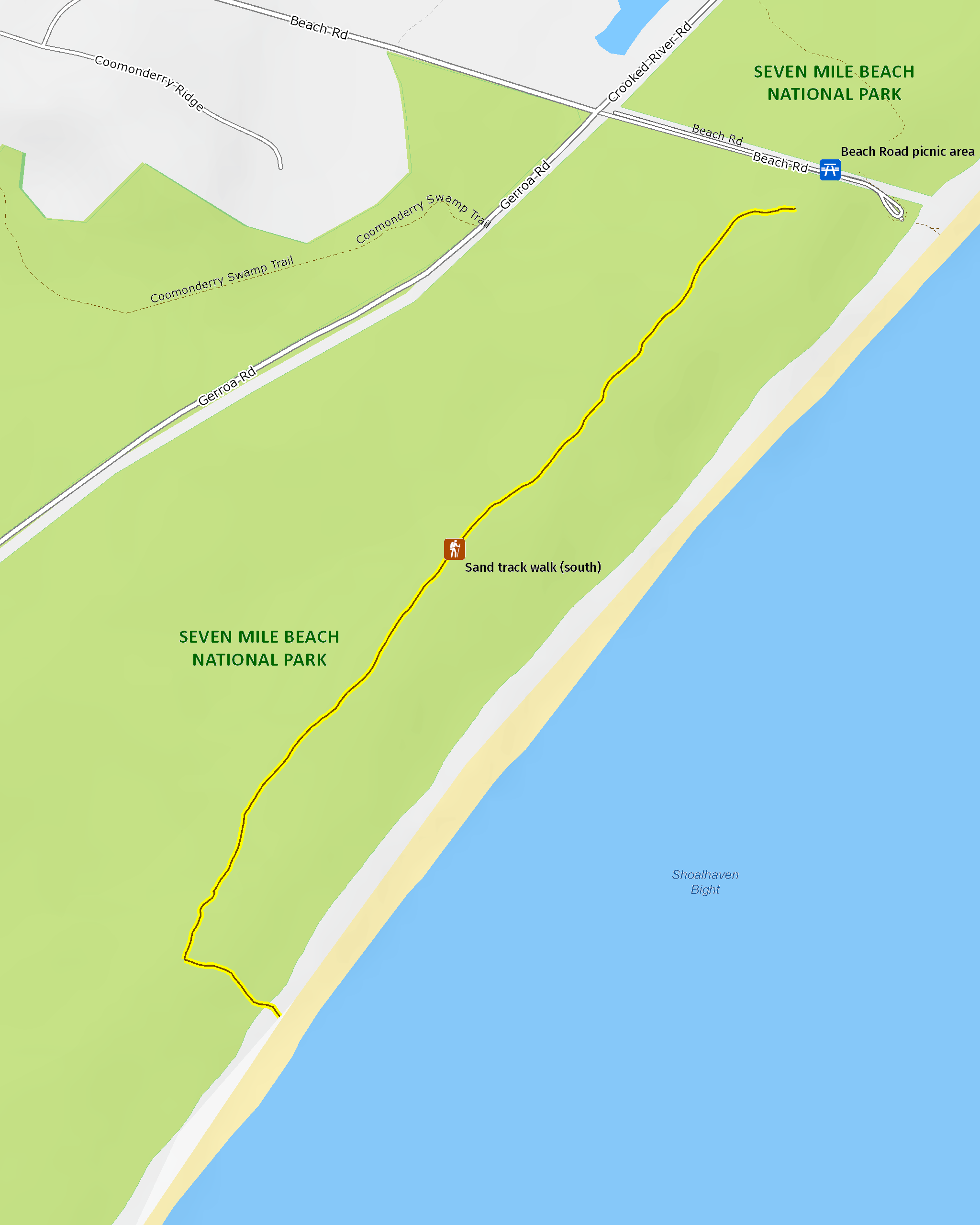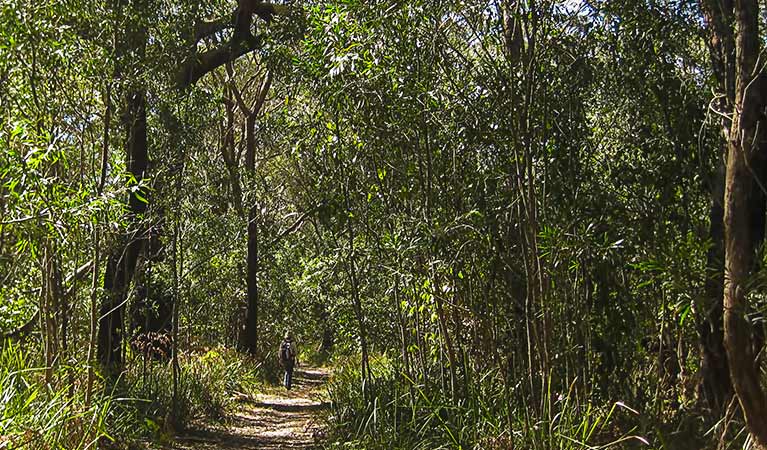Sand track walk (south)
Seven Mile Beach National Park
Overview
Take the Sand track walk through the ancient and untouched forest at Seven Mile Beach National Park, near Nowra, where you can go fishing, swimming, birdwatching and picnic.
- Distance
- 2km one-way
- Time suggested
- 1hr 30min - 2hrs 30min
- Grade
- Grade 4
- Please note
- Remember to take your binoculars if you want to birdwatch or whale watch.
The Sand track walk (south) starts from the southern end of the Beach Road picnic area, and takes you through forested hind dunes running parallel to the beach.
Easy enough for the whole family, this level walk wanders among the forest of majestic tall blackbutt trees, a reminder of the forests that were widespread along the coast until 200 years ago. There are also patches of rare bangalay sand forest and littoral rainforest along the way.
After a short time, you’ll emerge at the middle of Seven Mile Beach, halfway between Gerroa and Shoalhaven Heads. Here, you can admire the golden stretch of beach stretching out in both directions. Enjoy a swim here before retracing your step or and wander back along the beach, enjoying the sea breeze before sitting down for a picnic at Beach Road picnic area.
Map

Map legend

Local alerts
For the latest updates on fires, closures and other alerts in this area, see https://www.nationalparks.nsw.gov.au/things-to-do/walking-tracks/sand-track-walk-south/local-alerts
General enquiries
- National Parks Contact Centre
- 7am to 7pm daily
- 1300 072 757 (13000 PARKS) for the cost of a local call within Australia excluding mobiles
- parks.info@environment.nsw.gov.au
Park info
- in Seven Mile Beach National Park in the South Coast region
Seven Mile Beach National Park is always open but may have to close at times due to poor weather or fire danger.
Visitor info
All the practical information you need to know about Sand track walk (south).
Track grading
Features of this track
Distance
2km one-way
Time
1hr 30min - 2hrs 30min
Quality of markings
Limited signage
Experience required
No experience required
Gradient
Flat
Steps
Occasional steps
Quality of path
Formed track, some obstacles
Getting there and parking
Sand track walk (south) starts at Beach Road picnic area in the central precinct of Seven Mile Beach National Park. To get there:
From Sydney or Wollongong:
- Turn off the Princes Highway to Gerringong and drive south through Gerroa
- Turn left into Beach Road, about 4km south of the bridge
- Follow Beach Road to the end.
From Nowra:
- Turn off the Princes Highway at Bolong Road, Bomaderry
- Follow Bolong Road which becomes Gerroa Road
- Turn right into Beach Road and follow to the end.
The track begins at the southern end of the picnic area, where you’ll see a small sign at the edge of the bush.
Parking
Parking is available at Beach Road picnic area, including a designated disabled spot. Bus parking is available but no designated bus spots.
Best times to visit
There are lots of great things waiting for you in Seven Mile Beach National Park. Here are some of the highlights.
Autumn
Walk among the tall forest trees and enjoy a leisurely picnic surrounded by bush at Gerroa picnic area.
Spring
Enjoy the flowering wattles and birds nesting as you wander through the forest and dunes.
Summer
Start your day with an early morning swim, followed by breakfast at the beach picnic area, then a stroll along the long stretch of beach.
Winter
Feel the cool sea breeze on your face as you take in the tranquillity of the beach in winter, enjoy the scenic views, then head to the protected Beach Road picnic area for a leisurely lunch.
Weather, temperature and rainfall
Summer temperature
Average
17°C and 25°C
Highest recorded
42.4°C
Winter temperature
Average
8°C and 18°C
Lowest recorded
2.3°C
Rainfall
Wettest month
March
Driest month
September
The area’s highest recorded rainfall in one day
728.7mm
Maps and downloads
Permitted
Fishing
A current NSW recreational fishing licence is required when fishing in all waters.
Prohibited
Pets
Pets and domestic animals (other than certified assistance animals) are not permitted. Find out which regional parks allow dog walking and see the pets in parks policy for more information.
Smoking
NSW national parks are no smoking areas.
Learn more
Sand track walk (south) is in Seven Mile Beach National Park. Here are just some of the reasons why this park is special:
Aboriginal culture

The park’s beach, forest and wetland environments near Coomonderry Swamp were once important sources of food and materials for Aboriginal people. Part of the Dharawal language group, they had strong associations with other groups north to Sydney, inland to the southern highlands and south as far as Gippsland in Victoria. Today, you can see shell middens along the length of the foredune and in the forest. There are also several important ceremonial and culturally significant sites for Aboriginal people within the park.
- Then and now: Aboriginal culture Aboriginal culture then and now is a Stage 1 (Years 1-2) school excursion in Seven Mile Beach National Park, focusing on HSIE. Through story and creative expression, the life and culture of the local people are shared.
Aviation history

Sir Charles Kingsford Smith started his historic 1933 trans-Tasman flight to New Plymouth in New Zealand from Seven Mile Beach. This flight led to the inauguration of the trans-Tasman airmail service, making Seven Mile Beach a significant place in aviation history. In November 1933, Kingsford Smith ran passenger flights from the beach and in 1934, he used it for an emergency landing.
It's a wild world

For animal-lovers, Seven Mile Beach National Park has lots to offer. There are great birdwatching opportunities in the tall forests and at Coomonderry Swamp. Rainbow lorikeets, king parrots, and rosellas can all be seen, whilst thornbills, wrens, New Holland honeyeaters and brown cuckoo doves are also in abundance. There are also plenty of small mammals to see, such as antechinus and a range of tree-dwelling mammal species. As you wander through the forests, keep your eyes out for the greater gliders found in the park. Gliders are best seen at night, so be sure to enquire about a spotlight walk with NPWS Discovery Ranger.
- Sand track walk (north) Take the Sand track walk through the forest and admire the birdlife at Seven Mile Beach National Park, near Nowra. Pack a picnic lunch, and enjoy sweeping views at the end.
Unique landscape

This park supports several significant and endangered natural habitats. The forests are one of the last intact areas of Bangalay and blackbutt sand dune forest on the south coast. Coomonderry Swamp is also the only large semi-permanent freshwater wetland on the south coast. The area is significant as it shows a relatively intact example of a large scale dune barrier formed during the end of the last ice age, approximately 6000 years ago.
- Sand track walk (north) Take the Sand track walk through the forest and admire the birdlife at Seven Mile Beach National Park, near Nowra. Pack a picnic lunch, and enjoy sweeping views at the end.
- Sand track walk (south) Take the Sand track walk through the ancient and untouched forest at Seven Mile Beach National Park, near Nowra, where you can go fishing, swimming, birdwatching and picnic.

